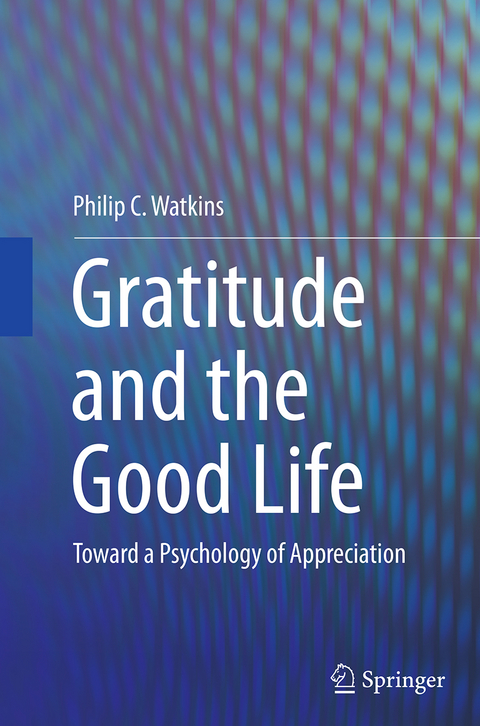
Gratitude and the Good Life
Springer (Verlag)
978-94-017-7856-5 (ISBN)
This book provides clear and sometimes surprising answers to why gratitude is important to living well. The science of gratitude has shown much growth in the last ten years, and there is now sufficient evidence to suggest that gratitude is one of the most important components of the good life. Both correlational and experimental studies have provided support for the theory that gratitude enhances well-being.
After providing a lucid understanding of gratitude, this volume explores the many aspects of well-being that are associated with gratitude. Moreover, experimental work has now provided promising evidence to suggest that gratitude actually causes enhancements in happiness. If gratitude promotes human flourishing, how does it do so? This issue is addressed in the second section of the book by exploring the mechanisms that might explain the gratitude/well-being relationship. This book provides an up to date account of gratitude research andsuggested interesting paths for future research, all while providing a theory of gratitude that helps make this information more understandable.
This book is very valuable to gratitude investigators, as well as all who are interested in pursuing this line of research, students and scholars of emotion and well-being and instructors of positive psychology courses and seminars.
Philip C. Watkins has been conducting research on gratitude since 1995 and have been cited as one of the pioneers in the science of gratitude. Since 2000 he has published 11 papers on gratitude, and have presented more than 50 gratitude research papers at national, international, and regional conferences. His research has been focused on understanding the factors that cause gratitude, and how gratitude enhances subjective well-being. His work has been covered in a number of national media outlets, including Ladies Home Journal, The Washington Post, Self, Redbook, and Psychology Today. Before turning his research energies to gratitude he focused on memory processes in depression, where he still maintains some interest. This research program resulted in three articles that were published in the Journal of Abnormal Psychology. Philip Watkins completed his undergraduate education at the University of Oregon, and went on to receive his M.A. and Ph.D.at Louisiana State University in clinical psychology. He completed his clinical internship at the University of Southern California Medical School. After joining the Psychology Department of Eastern Washington University as an assistant professor in 1990, he received early tenure and promotion to associate professor in 1995, and was promoted to full professor in 1999.
Chapter 1. Introduction: Why a Science of Gratitude.- Part I. The “What” of Gratitude.- Chapter 2. What is Gratitude and How can it be Measured?.- Chapter 3. What Causes Gratitude?.- Chapter 4. What Good is Gratitude? Gratitude and Well-Being.- Chapter 5. What are Grateful People Like? Characteristics of Grateful People.-Part II: The “How” of Gratitude: How is Gratitude Related to Well-Being?.- Chapter 6. Does Gratitude Enhance Present Experience?.- Chapter 7. Does Gratitude Enhance Experience of the Past?.- Chapter 8. Does Gratitude Enhance Social Well-Being?.- Chapter 9. Does Gratitude Enhance Coping Ability?.- Chapter 10. Does Gratitude Prevent Negative Affectivity?.- Chapter 11. How Does Gratitude Develop?.- Chapter 12. What Inhibits Gratitude?.- Chapter 13. How can Gratitude Interventions Be Used to Enhance Well-Being?.- Chapter 14. Conclusion: Explaining Gratitude.
| Erscheinungsdatum | 10.09.2016 |
|---|---|
| Zusatzinfo | 10 Illustrations, black and white; X, 259 p. 10 illus. |
| Verlagsort | Dordrecht |
| Sprache | englisch |
| Maße | 155 x 235 mm |
| Themenwelt | Geisteswissenschaften ► Philosophie ► Ethik |
| Geisteswissenschaften ► Psychologie ► Humanistische Psychotherapien | |
| Geisteswissenschaften ► Psychologie ► Psychoanalyse / Tiefenpsychologie | |
| Studium ► Querschnittsbereiche ► Prävention / Gesundheitsförderung | |
| Sozialwissenschaften ► Soziologie | |
| Schlagworte | Beauty of Gratitude • Death, Deprivations and Gratitude • Development of Gratitude • Emotional Health • Gender and Gratitude • Grateful Reframing • Gratitude and Appreciation • Gratitude and Enhancing Positive Memories • Gratitude and Enhancing Relationships • Gratitude and Happiness • Gratitude and Physical Well-Being • Gratitude and Positive Psychology • Gratitude and Well-Being • Measuring Gratitude • Memory and Happiness • Positive Emotion in the Coping Process • positive psychology • Recognitions of Gratitude • Science of Gratitude • Social Emotion and Gratitude • The Social-Cognitive Model of Gratitude • Understanding the Character of Grateful People • Well-Being and Relationships |
| ISBN-10 | 94-017-7856-6 / 9401778566 |
| ISBN-13 | 978-94-017-7856-5 / 9789401778565 |
| Zustand | Neuware |
| Informationen gemäß Produktsicherheitsverordnung (GPSR) | |
| Haben Sie eine Frage zum Produkt? |
aus dem Bereich


